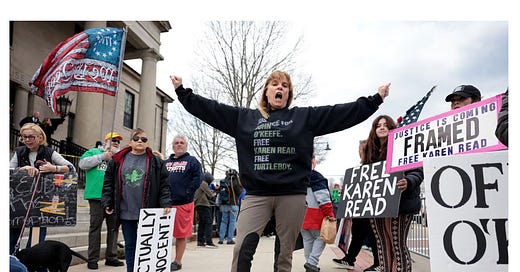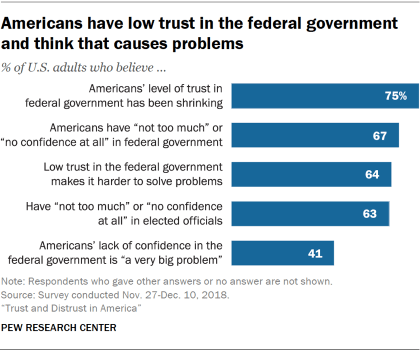Americans Just Don't Trust the Government, and the Mistrust Has Been Increasing for Decades
There IS a solution to this problem; let's DO it.
The above photo is from a Boston Globe article about a raging controversy in the small town of Canton (near Boston). A woman, Karen Read, is charged with murdering her boyfriend, a Boston police officer. Very many people believe Read is innocent and that the corrupt police department is, for some corrupt reason, in cahoots with those who really murdered the police officer.
The same Boston Globe article reports:
Maurice Cunningham, a retired professor of political science at the University of Massachusetts Boston, said mistrust of institutions — particularly government — has swept the country, and that mood has now stirred up Canton.
“This distrust has now pervaded even small-town government,” Cunningham said. “To have something like this pop up, particularly a small town like Canton engaging in suspicion of its own police department in conspiratorial ways, it’s really striking.”
Regarding this mistrust, the Pew Research Center reports:
“1. How Americans see problems of trust
Trust in the government and the people running it is low, and many Americans think this lack of trust is a serious problem for the country. Two-thirds of Americans perceive that the public has low confidence in the federal government, and three-quarters believe – correctly, according to polling that dates back to the late 1950s – that confidence has been shrinking over time. About four-in-ten say the public’s level of confidence in the federal government is a very big problem, and a similar share thinks it’s a moderately big problem. Although the public’s confidence in the federal government does not rank particularly high on a list of problems facing the country, nearly two-thirds of those interviewed say that the public’s low level of trust in the federal government makes it harder to solve many of the country’s problems.” [emphasis added]
Declining trust in each other as well
The same Pew Center report begins with this paragraph:
Trust is an essential elixir for public life and neighborly relations, and when Americans think about trust these days, they worry. Two-thirds of adults think other Americans have little or no confidence in the federal government. Majorities believe the public’s confidence in the U.S. government and in each other is shrinking, and most believe a shortage of trust in government and in other citizens makes it harder to solve some of the nation’s key problems. (emphasis added)
What is the cause of this decline in trust?
It is not hard to understand why there is declining trust in the federal government.
Almost everybody today knows that the federal government is controlled by Big $ and that Big $ is motivated to promote the desires and interests of the richest people with great power and privilege, and not the desires and interests of the vast majority of people—the have-nots.
Not surprisingly, therefore, the Pew Center reports:
“Campaign donors and lobbyists are widely viewed as having too much influence on members of Congress. Eight-in-ten U.S. adults say the people who donate money to political campaigns have too much influence on the decisions members of Congress make. And 73% say lobbyists and special interest groups have too much influence. Large majorities of Republicans and Democrats alike say campaign donors, lobbyists and special interest groups have too much influence.”
“By contrast, 70% of Americans say the people who live in representatives’ districts have too little influence over the decisions their representatives make.”
from Business Insider:
Nor is it hard to understand why there is declining trust by Americans in each other.
The American ruling class—the billionaire plutocracy that holds the real power and owns the mass media—has been implementing a divide-and-rule strategy, in particular what I call the new 21st century divide-and-rule strategy, to make about half of Americans view the other half as the enemy, as immoral or dangerously stupid. This strategy employs a host of “social issues” for this purpose, deliberately and deceitfully framing them in a way designed to create mutual hostility between Americans despite the fact that when the issues are honestly framed without the current censorship of key facts then there would be unity among the vast majority of Americans. I discuss how this works in some detail here, and I hope you will read about it.
Obviously, Americans want REAL, NOT FAKE, democracy.
The vast majority of Americans (as I prove here) want, and say they want whenever anybody asks them, which is unfortunately seldom today, to remove the rich from power to have real, not fake, democracy with no rich and no poor.
The key obstacle to getting what most American want—what I call egalitarian revolution—is this: The huge numbers of Americans who want this don’t know that huge numbers of Americans want it; they don’t know this because the mass media work very hard to keep it a secret, which is why one never sees ordinary people expressing this egalitarian revolutionary aspiration in print or on radio or T.V. The result is that everybody has a mental image of other people as being opposed to egalitarian revolution. Because of this false mental image of OTHER people, everybody thinks they would be wise to keep their personal egalitarian revolutionary aspiration a secret (at least not to let their reform struggles be associated with this radical aspiration), lest others think they are crazy or even worse. So people self-censor on this question, which just strengthens the mass media’s censorship effect. People refrain from doing the things that they would otherwise do to build the explicitly egalitarian revolutionary movement, a movement that CAN (as I discuss here) remove the rich from power DESPITE the proverbial 82nd Airborne Divisioj.








